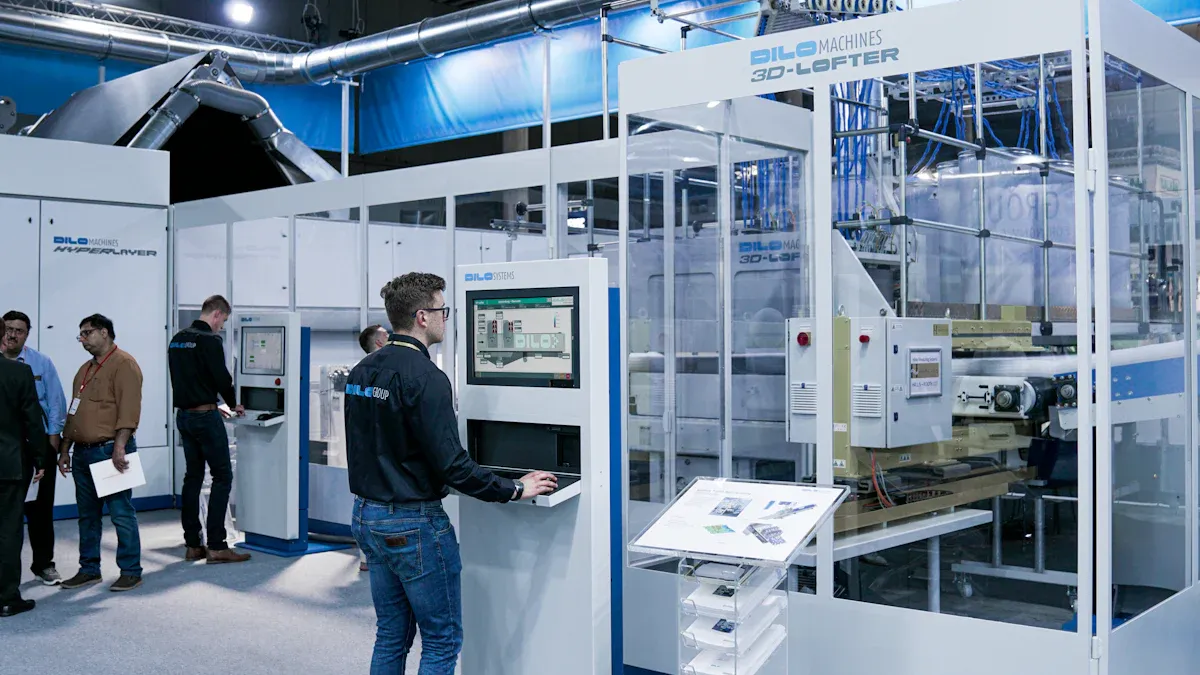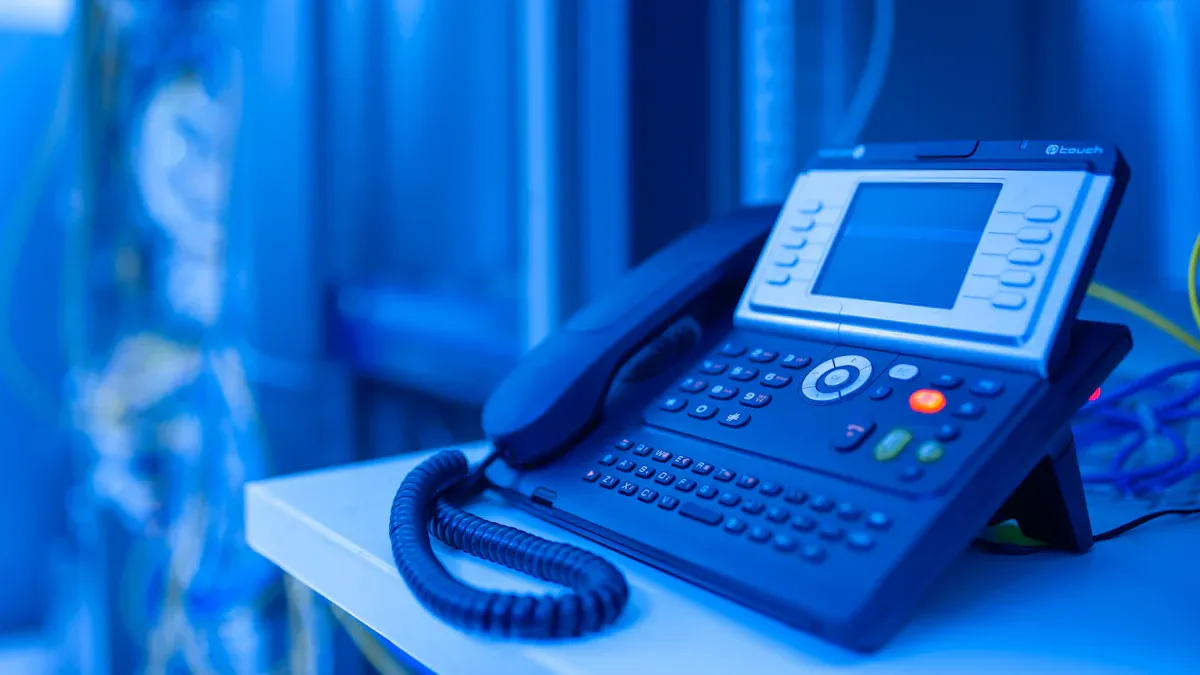
Reliable communication in harsh environments plays a vital role in industrial operations. Rugged industrial telephones ensure uninterrupted connectivity, even in extreme conditions like dust, moisture, and impact. Industries such as manufacturing, petrochemicals, and logistics increasingly depend on these devices, with the market projected to reach $3.5–$4 billion by 2025. Technological advancements, including IoT integration and 5G adoption, further enhance their efficiency. ATEX industrial telephones and IP industrial telephones now offer unmatched durability and adaptability, making them indispensable in critical applications.
What Are Rugged Industrial Telephones?

Definition and Purpose
Rugged industrial telephones are specialized communication devices designed to operate reliably in harsh and demanding environments. These telephones are engineered to withstand extreme conditions, including exposure to dust, moisture, high temperatures, and physical impact. Their primary purpose is to ensure uninterrupted communication in industries where standard telephones fail due to environmental challenges.
Tip: Rugged industrial telephones are essential for industries like manufacturing, petrochemicals, and logistics, where communication reliability directly impacts safety and productivity.
Key Features and Characteristics
Rugged industrial telephones possess unique features that set them apart from conventional communication devices. These features include:
- Durability: Built with robust materials such as stainless steel or reinforced polycarbonate to resist physical damage.
- Weatherproofing: Equipped with seals and coatings to prevent water and dust ingress, ensuring functionality in outdoor or wet conditions.
- Explosion-Proof Design: Certified models are available for hazardous environments, such as oil refineries or chemical plants, where explosive gases may be present.
- Enhanced Audio Quality: Designed to deliver clear sound even in noisy industrial settings.
- Ease of Use: Intuitive interfaces and large buttons allow operation with gloves or under challenging conditions.
These features make rugged industrial telephones indispensable for industries requiring reliable communication in adverse conditions.
Importance in Industrial Applications
Rugged industrial telephones play a critical role in maintaining communication reliability across various sectors. Their importance can be summarized as follows:
- Safety Assurance: In hazardous environments, these telephones enable quick communication during emergencies, reducing response times and enhancing worker safety.
- Operational Efficiency: Reliable communication ensures smooth coordination between teams, minimizing downtime and improving productivity.
- Adaptability: These devices are versatile and can be deployed in diverse settings, from construction sites to offshore platforms.
Industries such as construction, healthcare, logistics, and manufacturing have widely adopted rugged industrial telephones due to their ability to function in adverse conditions. The evolution of mobile technology has further enhanced their user interfaces and communication capabilities, making them a vital tool for modern industrial operations.
Types of Rugged Industrial Telephones
Rugged industrial telephones come in various types, each designed to address specific environmental challenges. These devices ensure reliable communication in industries where adverse conditions demand specialized solutions.
Weatherproof Telephones
Weatherproof telephones are engineered to withstand exposure to harsh weather conditions, including rain, snow, and extreme temperatures. Their robust construction often includes corrosion-resistant materials like aluminum alloy die-casting and seals that meet IP67 standards. These telephones are ideal for outdoor installations, such as construction sites and offshore platforms, where environmental factors can compromise standard communication devices.
Note: IP67-rated telephones can resist dust ingress and immersion in water up to one meter for 30 minutes, ensuring uninterrupted functionality in wet or dusty environments.
Explosion-Proof Telephones
Explosion-proof telephones are designed for hazardous environments where flammable gases, vapors, or dust may be present. These devices comply with strict safety standards, including Zone 1 and Zone 2 classifications, to prevent ignition sources. Their rugged construction and specialized enclosures make them suitable for chemical plants, coal mines, and oil refineries.
| Classification Type | Details |
|---|---|
| Explosion Protection | Zone classification: Zone 1 and Zone 2 |
| Applications | Suitable for chemical plants, coal mines, power stations, and heavy industry requiring reliable telephony under adverse conditions. |
Vandal-Resistant Telephones
Vandal-resistant telephones are built to endure intentional damage in high-risk areas, such as public spaces and industrial facilities. Features like captive cover screws and reinforced housings prevent tampering and ensure long-term durability. These telephones are commonly deployed in locations prone to vandalism, including transportation hubs and remote industrial sites.
| Rating | Description |
|---|---|
| IP56 | Primary standard |
| IP57 | Intermediate standard |
| IP67, IP68 | Advanced protection levels |
| MIL-STD-810G | Military-grade durability |
Each type of rugged industrial telephone addresses unique challenges, ensuring reliable communication in environments where standard devices fail.
Key Considerations When Choosing a Rugged Industrial Telephone
Selecting the right rugged industrial telephone requires careful evaluation of several factors. Each consideration ensures the device meets the demands of specific industrial environments while delivering reliable performance.
Understanding IP Ratings
Ingress Protection (IP) ratings indicate a device’s ability to resist dust and water. These ratings are critical for determining whether a rugged industrial telephone can withstand environmental challenges. For example, an IP54-rated telephone offers basic protection against dust and water splashes, making it suitable for general use. In contrast, an IP67-rated device provides complete dust protection and can be submerged in water, making it ideal for outdoor or unpredictable weather conditions.
| IP Rating | Description | Recommended Use |
|---|---|---|
| IP54 | Dust protected, water splashes | Basic ruggedness for general use |
| IP65 | Dust tight, withstands water jets | Suitable for manufacturing and utilities |
| IP67 | Dust tight, submersible in water | Ideal for unpredictable weather conditions like construction sites |
Tip: Always match the IP rating to the specific environmental conditions of the intended application to ensure optimal performance.
Evaluating Durability and Build Quality
Durability is a cornerstone of rugged industrial telephones. These devices must endure physical impacts, extreme temperatures, and exposure to chemicals. High-quality materials like stainless steel or reinforced polycarbonate enhance their resilience. Performance metrics such as drop resistance and water resistance provide measurable indicators of durability. For instance, many models can withstand drops from up to 5 feet onto concrete and remain operational after being submerged in water.
| Feature | Specification |
|---|---|
| Drop Resistance | Endures drops from up to 5 feet onto concrete |
| Water Resistance | IP68/IP69K ratings, submerged in water up to 5 feet for 30 minutes |
| Dust Resistance | Full protection against dust |
| Typical Use Cases | Construction sites, industrial facilities, military operations |
| Examples of Devices | Kyocera DuraForce PRO 3, Samsung Galaxy Rugged series |
Devices with military-grade certifications, such as MIL-STD-810G, offer additional assurance of durability in extreme conditions.
Cost vs. Value
While rugged industrial telephones often come with a higher price tag, their long-term value outweighs the initial investment. These devices reduce maintenance costs and downtime by offering superior durability and reliability. Features like multi-shift battery life, glove-friendly displays, and extra-loud audio enhance their usability, further justifying the cost.
Key features that add value include:
- Multi-shift battery life
- Glove-friendly display
- Extra-loud audio
- Resistance to shocks, vibrations, and extreme temperatures
- Protection from oil, chemicals, and micro particles
Note: Investing in a high-quality rugged industrial telephone minimizes the risk of frequent replacements, making it a cost-effective solution for industrial communication.
Matching the Telephone to the Environment
The environment plays a significant role in determining the right rugged industrial telephone. Devices used in construction sites require high drop resistance and water protection, while those in chemical plants must resist exposure to hazardous substances. Features like waterproofing, pressure resistance, and operational capability in extreme temperatures ensure the telephone performs reliably in its intended setting.
Key environmental considerations include:
- Waterproofing for outdoor or wet environments
- Resistance to oil and chemicals for petrochemical industries
- Shock and vibration resistance for heavy machinery operations
- Puncture resistance for high-risk areas
Selecting a telephone tailored to the specific environment ensures optimal performance and longevity.
Top Models of Rugged Industrial Telephones in 2025

Model 1: Features, Specifications, and Pricing
Model Name: Titan X-500
The Titan X-500 stands out as a robust solution for extreme industrial environments. Its IP68 rating ensures complete protection against dust and water immersion. The device features a stainless steel enclosure, making it resistant to physical impacts and corrosion. It also includes advanced noise-canceling technology, ensuring clear communication in noisy settings.
Key Specifications:
- IP Rating: IP68
- Material: Stainless steel
- Audio: Noise-canceling microphone and loudspeaker
- Temperature Range: -40°F to 140°F
Pricing: Starting at $1,200 per unit.
Note: The Titan X-500 is ideal for offshore platforms and heavy manufacturing facilities.
Model 2: Features, Specifications, and Pricing
Model Name: Duratel Pro-7
The Duratel Pro-7 combines durability with smart features. It supports IoT integration, enabling remote monitoring and diagnostics. Its explosion-proof design meets ATEX Zone 1 standards, making it suitable for hazardous environments. The device also features a glove-friendly keypad for ease of use.
Key Specifications:
- Explosion Protection: ATEX Zone 1 certified
- Connectivity: IoT-enabled
- Keypad: Glove-friendly design
- Audio: Enhanced loudspeaker for high-noise areas
Pricing: Starting at $1,500 per unit.
Tip: This model is perfect for chemical plants and oil refineries.
Model 3: Features, Specifications, and Pricing
Model Name: Vanguard ToughTalk 2025
The Vanguard ToughTalk 2025 offers military-grade durability with MIL-STD-810G certification. Its IP69K rating ensures resistance to high-pressure water jets and extreme temperatures. The device includes a multi-shift battery life, making it reliable for long operations.
Key Specifications:
- Durability: MIL-STD-810G certified
- IP Rating: IP69K
- Battery Life: Up to 48 hours
- Temperature Range: -50°F to 160°F
Pricing: Starting at $1,800 per unit.
Recommendation: This model is best suited for construction sites and military operations.
Rugged industrial telephones deliver unmatched reliability in challenging environments, ensuring uninterrupted communication. Their durability, weatherproofing, and vandal-resistant features enhance operational efficiency and safety.
| Feature | Benefit |
|---|---|
| Durability | Designed to withstand harsh conditions, ensuring reliable communication in adverse situations. |
| Weatherproof | Operates effectively in extreme weather, maintaining communication without interruption. |
| Vandal-resistant | Protects against damage, ensuring functionality in challenging environments. |
| Noise-canceling microphone | Enhances clarity of communication in loud environments. |
| Speed dial functionality | Allows for quick access to important contacts during emergencies. |
| Easy installation | Can be mounted in various locations, providing flexibility in deployment. |
| Line powered | Ensures continuous operation without reliance on batteries. |
Organizations adopting these devices report up to 30% fewer failures, reducing costly downtime. With a lifecycle of 5-7 years, rugged industrial telephones offer a cost-effective solution for modern industries. Investing in the right model tailored to specific needs ensures long-term value and operational success.
FAQ
What is the lifespan of a rugged industrial telephone?
Most rugged industrial telephones last 5–7 years. Their durable construction ensures reliability in harsh environments, reducing the need for frequent replacements.
Can rugged industrial telephones be used in extreme temperatures?
Yes, many models operate in temperatures ranging from -50°F to 160°F. Always check the specifications to match the device with the intended environment.
Are rugged industrial telephones compatible with modern communication systems?
Many models support IoT integration, VoIP, and 5G connectivity. These features enhance compatibility with modern industrial communication networks.
Tip: Verify compatibility with your existing systems before purchasing to ensure seamless integration.


